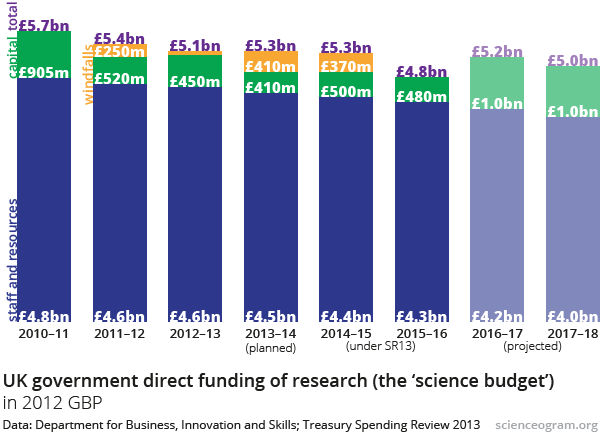Autumn Statement 2014 continues the decline in science funding
George Osborne’s Autumn Statement had kind words but little good news for science. Despite reiterating that science is his ‘personal priority’, the Chancellor’s announcements nonetheless promised no extra investment, and the outlook is especially bleak in light of recent comments from Science Minister Greg Clark indicating that a future Conservative government could not guarantee the cash ringfence around the core science budget.
With the launch of the Science and Innovation Strategy deferred, it is difficult to discern a coherent, long-term strategy for investment in science, and there’s no sign of a framework to arrest the managed decline in science funding we’ve seen since 2010.
The headline figures for research funding haven’t changed since the 2013 Spending Review. This is a slight update of our graph from back then, revised to include actual governmental figures rather than inferring them from announcements.

In that Spending Review, Osborne announced that £1.1bn per year would be spent on capital for science—buildings and equipment—which brought that budget back to just over the level it was at before it was slashed in 2010. The core science budget remains frozen in cash terms, meaning it has already dropped by 10% over the course of this parliament thanks to erosion from inflation. If the cash ringfence is preserved, as assumed on this graph, this managed decline in UK science spending will continue into the next parliament. If the ringfence is not preserved, the picture will be even worse. The ad hoc windfalls for science announced by the Chancellor are not enough to stabilise the budget, and their irregularity makes planning difficult for the research community.
It’s also important to note that this graphic doesn’t consider research spending in other government departments, which has seen significant cuts—in some cases 50% in a single financial year.
Much of the publicity around yesterday’s speech focussed on some of the high-profile announcements for new facilities which this budget will fund, such as a new £235m materials research centre to be built in Manchester. These announcements earmark a significant amount of the capital funding for specific projects, continuing the trend of central government dictating how science capital money is disbursed. As we’ve said before, it’s not necessarily a bad thing in a democracy for ministers to make high-level decisions about budgetary allocations, but the mechanisms behind these decisions need to be more transparent.
There was no mention of the ‘core’ science budget, which primarily pays for staff, smaller pieces of equipment and scientific consumables. Given that this budget continues to be eroded by inflation, it’s not clear how the government intends to capitalise on its newly announced infrastructure: in the worst case, shiny new buildings like the Manchester research centre will either lie empty, or effectively displace staff and resources from universities and facilities elsewhere in the UK.
Indeed, the only information we have about the future of the cash ringfence is that a Conservative government couldn’t promise to protect it. This hugely significant announcement was made not in yesterday’s Autumn Statement but as part of a brief interview with Greg Clark in Research Fortnight. Science is Vital wrote an open letter to Dr Clark last week seeking clarification, but have yet to receive a response.
This disappointing Autumn Statement comes just a week after the release of a report on Business–University Collaboration by the cross-party Business, Innovation and Skills Committee within parliament. The report’s summary concludes:
Nurturing the innovation system long-term requires ambitious goals for the sector and stable innovation support systems. … We urge the Government to aim for 3 per cent of GDP to be spent on research and development (R&D) by 2020. We also recommend that Government continues to protect the science budget and maintain, if not improve, funding for science and innovation in the next Spending Review.
The government could do worse than heed this advice. Rather than piecemeal announcements for capital spending, long-term, ambitious and stable support for science would benefit health, the environment and the economy both in the UK and around the world.